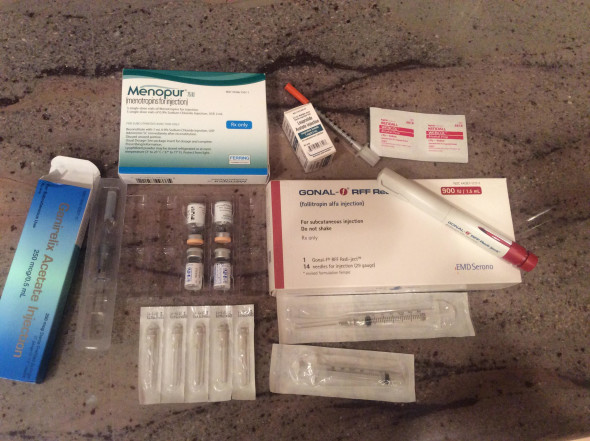Contributor Rachel Winston opens up about her battle with infertility for those thinking about IVF or egg freezing.
For those of you who cannot conceive, or those of you thinking about freezing eggs or just want to learn about IVF, this is for you. Having troubles conceiving can be super stressful and overwhelming—I know. I personally freaked out for two years after being unable to conceive after I had my daughter. The adrenaline and general stress make it almost impossible to make the most logical decisions, and when entering into the expensive world of IVF, you need to have the planning and clarity of a well-organized public company.
1. The first thing you need to do is to get preliminary testing done by a reproductive endocrinologist (RE), and not your OBGYN. Getting testing done by a RE is important because they know what tests to order, they can get test results back quicker, and the information will be more reliable and transportable to other clinics. Testing done through your local OBGYN or primary care doctor can be a waste of time. They often cannot order all the necessary tests, do know which tests to order, and the accuracy is not always on par with fertility clinics (especially specialty tests like sperm analysis).
I don’t want to scare you, but time is not on your side when it comes to fertility. If you’re under 35, and have been trying to conceive for at least a year without success (or if you are over 35 and have been trying for six months) you need to book an appointment with a large, local fertility clinic ASAP. Seriously, don’t worry about choosing the right clinic or doctor at this point—think large clinic or university fertility center (Cornell, UCSF, etc). Most major metro areas have fertility centers now, and this is important to nail down if you’re thinking about IVF to begine with. Get the appointment now. Make the phone call right now before reading on, I’ll wait.
It can take months to get an appointment with a fertility doctor, which is why you want to start the process now. Try to ask them if you can come in before you meet with the doctor to get the preliminary, standard tests done before you see him. It will take some time to gather all this information. Testing is usually done on the third day of your menstrual cycle. Some clinics will also want you to retest again later in your cycle to see if you ovulated. Preliminary testing takes time, expect to waste valuable and potentially fertile months just getting through the testing process. Expect that it will take around one to three months for you to assemble all testing, and for you to meet with a doctor for a preliminary chat.
2. It is very important that you have physical or email/electronic copies of your results. You will need them throughout your IVF/ infertility journey and it is much easier for you to personally give them to the various doctors you will be seeing rather then waiting for the clinic to send them over. Almost everyone I have met that has undergone IVF/ egg freezing successfully has seen multiple doctors. Keep your own records: it will make it easier to see other doctors faster, as you won’t want there to be any major time gaps or delays in your process of growing your family.
3. Most clinics require you to fill out a lengthy form for the first appointment. Because this is your first appointment with a fertility specialist, ask if you can have the form emailed to you before your appointment and begin filling it out now. Getting the form now will allow you time to prepare and think about all the answers. It will also allow you to write out a list of questions that come to mind while in the quiet safe space of your home, rather than the busy-overwhelming doctor’s office. I recommend saving a copy of the form for your records, as every clinic has a similar form that you will have to fill out, and if you’re even thinking about IVF for 2 seconds on your fertility journey, this will go a long way in streamlining your process.
Some of the things they will ask you are for your obstetrical history, including how long you have been trying to conceive, previous pregnancies and miscarriages, your gynecological history, previous surgeries, medical conditions, drug allergies, family history, current medications, and male partner history. I recommend providing your menstrual cycle history as well: how many days your cycle lasts, if you are irregular or have painful periods, the length of each of the last 6 cycles, and any ovulation tests you have done at home. Even if they do not specifically ask for these things, make a list of them, and have them available for your appointment. They matter.
4. The fertility clinic will be familiar with all the tests that you need to do. It is important that both you and your partner are tested at the same time so as not to waste time with unnecessary appointments. Save yourself time, frustration, and potentially money. You want to make sure that the doctor has a full fertility picture. I have heard of cases where the female partner goes through months of tests, only to find out that it was the male partner that was responsible for their infertility.
- Make sure you ask for at least the following testing before your first or second appointment:
- Male partner semen analysis: sperm count, motility, morphology
- Male partner blood tests
- Female blood tests: day 3 FSH, AMH, estradoil, LH, TSH, prolactin, progesterone (if they want to see if you ovulated)
- Genetic testing for both partners: this is annoying but it important that it is done before you start IVF
- Female hysterosalpingogram (HSG): used to see if there are any blockages in the fallopian tubes
- Female transvaginal ultra sound: That’s an internal ultra sound, the doctor will look at your uterus, cervix and ovaries
- Ask to get your antral follicle count: that means how many tiny follicles they can see on day 3 of your menstrual cycle, they can do that via the transvaginal ultrasound
Being prepared, knowing what to ask for, and keeping organized will help you make better decisions throughout this process, and will result in saving time and money when choosing if IVF and egg freezing is right for you.
If you end up going beyond just thinking about IVF and egg freezing, please take a minute to read this article I wrote about taking vitamins and supplements for fertility— it may go a long way in helping you make the beautiful baby you’ve always wanted.











Really Helpful and well detailed, thanks